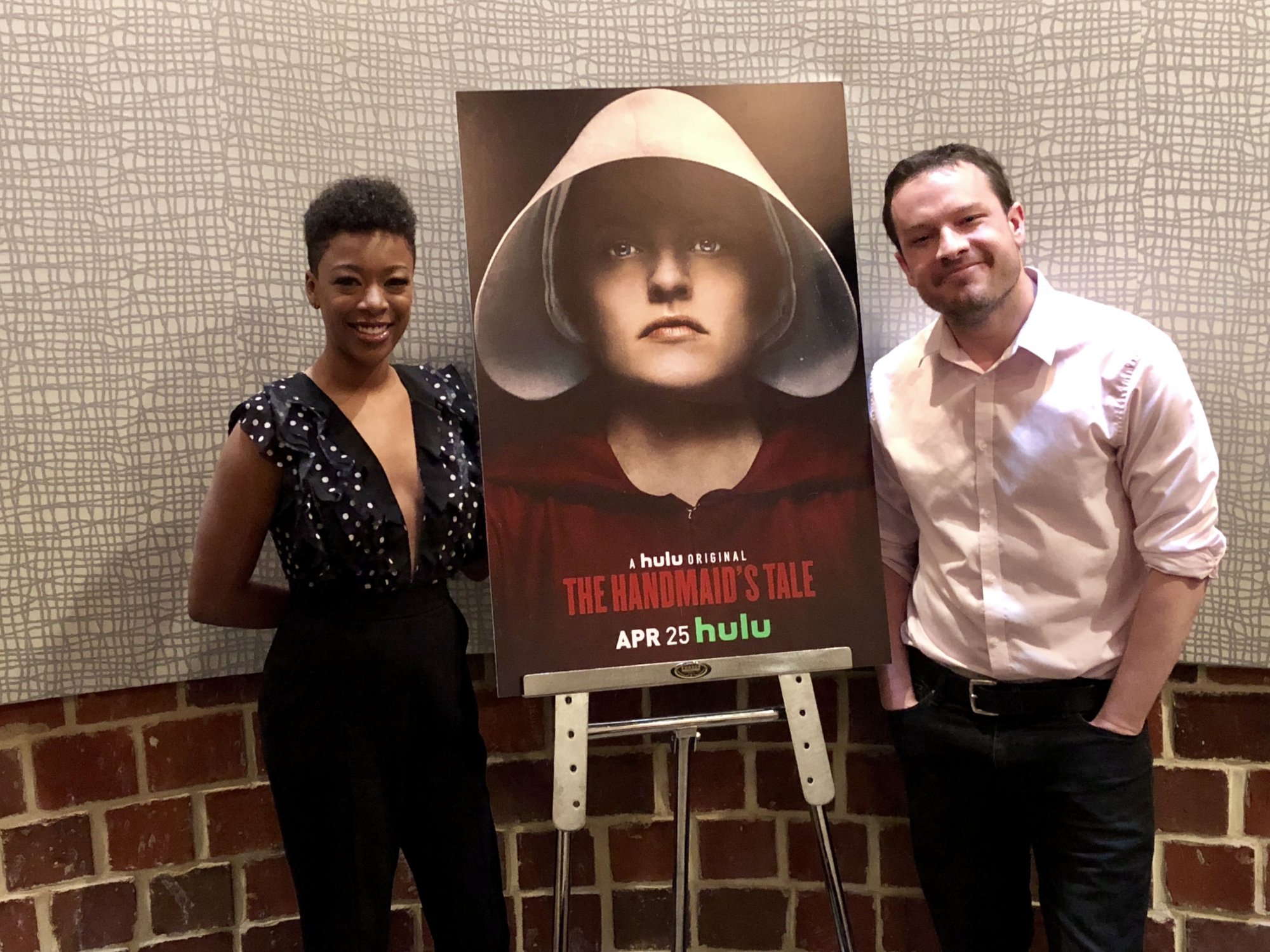WASHINGTON — It was crowned Best TV Drama at both the Emmys and Golden Globes.
On Wednesday, “The Handmaid’s Tale” returns for another harrowing season on Hulu.
Rather than release all 10 episodes, Hulu is piece-mealing them two at a time, which is just fine by Emmy nominee and D.C. native Samira Wiley, who suggests taking your time.
“I actually usually tell people, ‘Do not binge watch this show,'” Wiley said. “You binge watch something else, not ‘The Handmaid’s Tale!’ You need time to process. Once a week!”
Based on Margaret Atwood’s 1985 novel, the story is set in a dystopian future where a fundamentalist theocratic dictatorship forces the few remaining fertile women to live as concubines, raping them to procreate for the wealthy folks of Gilead. This includes June (Elisabeth Moss), who is nicknamed Offred (“Of Fred”) by her captor Fred Waterford (Joseph Fiennes). Is she doomed to this existence or can she rebel with her best friend Moira (Wiley)?
“This whole show feels like a collaborative effort to get this story right,” Wiley said of creator Bruce Miller’s creative team. “Even the costumes, you have this hood that’s covering your head that you literally cannot say something to your neighbor without moving your [head].”
Season 2 picks up with Moira having escaped to Canada to find June’s husband Luke.
“We see her struggle this season through all the difficulties of being a refugee,” Wiley said. “We see her get a health insurance card, we see her get money when women aren’t allowed to have any possessions. She’s not getting raped every day. These are wonderful things, but it’s the unfamiliar. … Gilead was the evil you know. … It’s lonely and she doesn’t have June.”
It’s the latest challenge for a character who underwent quite the evolution in Season 1. When June first arrived at the Red Center, Moira told her, “Hold your sh** together.” Later, after Moira fell into prostitution at the Jezebel brothel, June turned the same advice back on her.
“The character we see [when] we are first introduced to Moira, that’s what attracted me to the piece,” Wiley said. “She’s such a badass, she’s got so much resolve and she’s going to be the one on the front lines. To see that wither away in the first season, when we see her at Jezebel’s a shell of herself, it’s so disheartening. … I had to tell myself this is for survival.”
These dark moments make it all the more rewarding when she mounts an escape.
“The only way we see that she has found some triumph is when she is escaping things,” Wiley said. “When she’s escaping the Red Center, there’s a rush of exhilaration. When she’s escaping Jezebel’s, then there’s a smile on her face. When she finally escapes into Canada, it’s getting away! When we finally see the Canadian license plate, that was a fun moment.”
Such escape plots epitomize the show, as Moira and June have to communicate on a subway platform without saying a word, showing the nuanced acting chops of Wiley and Moss.
“There’s so many scenes where it’s just about Elisabeth and Moira’s eyes,” Wiley said. “I don’t know where she came from. She is a literal ball of pure talent. The way that I am continually inspired every single day by watching her work is a gift. It feels like some special masterclass to learn how to act. To be able to have a scene partner, it’s like having an amazing tennis match against one of the best players in the world and somehow it’s making you better.”
Their interactions with the upper-class women are even more complex. This includes Ann Dowd’s Aunt Lydia and Yvonne Strahovski’s Serena Joy Waterford, who must hold Moss’ head in her lap while her husband rapes her, pretending she’s a participant in the conception.
“I honestly do believe that all of the women in Gilead are oppressed, not just the handmaids,” Wiley said. “The men don’t have to do anything because they’ve set up this weird caste system where the women in-fight with each other because they think they’re of different classes, but they’re really not. What if they realize: ‘No guys, what if we just banded together?'”
Thus, the handmaids represent Hollywood actresses during the #MeToo movement.
“I want it to be my responsibility as an artist to reflect the time that we’re living in, and somehow, I’ve fallen into a show that is doing exactly that,” Wiley said. “I think it’s a testament to how in-tune our writers are to exactly where our country is. … It also makes me feel this immense amount of responsibility to get this story right and tell it with integrity.”
Wiley similarly captured the zeitgeist in Netflix’s “Orange is the New Black,” particularly in Season 4 when her character Poussey is choked to death by a prison guard in the cafeteria.
“That was a very conscious decision by the writers to tell a story that was reflecting Mike Brown, Trayvon Martin, all of the young people of color getting cut down in these streets,” Wiley said. “I felt so hurt when I first heard [of my character’s death]. Jenji Kohan, the creator, basically told me they couldn’t tell this story with anyone else. The way Poussey had come into the hearts of viewers was something that couldn’t be recreated and I felt all of a sudden really honored. Like, ‘Alright, yeah, let’s get it! Let’s do it! Let’s tell it and tell it right!'”
While her character was killed off the show, Wiley married co-writer Lauren Morelli in 2011. The same-sex union was supported by her pastor parents, whose church was the only traditionally black Baptist church in D.C. to perform same-sex unions back in 2007.
“My parents are retired, but for my whole life they were pastors in the Baptist church, and now they are also United Church of Christ, which is a little more progressive,” Wiley said.
Growing up in D.C., she remembers her first introduction to the world of acting.
“I listened to WTOP every morning!” Wiley said. “I will never forget the day that I heard on the radio about a summer camp at Howard University for kids that wanted to act. … I don’t know how serious [my parents] took me, but they were like, ‘Yeah, let’s take her to camp.’ So, they took me, I got in the camp and I stayed there for the next seven summers.”
Wiley continues to be impressed by the number of D.C. folks making it in showbiz.
“A lot of amazing people come from here,” Wiley said. “When I was in high school at Duke Ellington, Taraji [P. Henson], another local, came to visit while I was a student there. To be sitting here now, this full circle thing, I’ve seen her at the Emmys on the red carpet, it’s crazy! But it’s also awesome and feels like, ‘Of course we’d come from here!’ D.C.’s good stock!”
Listen to our full conversation with Samira Wiley below:








